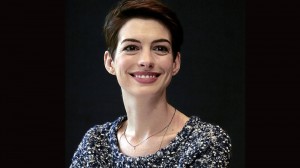
FOR ANNE Hathaway, the physical transformation demanded by the role of Fantine included a 25-pound weight loss and severely cropped hair. RUBEN NEPALES
LOS ANGELES—Will Anne Hathaway kick off her possible awards season sweep on Sunday night at the 70th Golden Globe Awards?
Standing in the way of Anne—who has been making many moviegoers sniffle and applaud her portrayal of Fantine in “Les Miserables”—are the other Golden Globe best supporting actress nominees: Helen Hunt in “The Sessions;” Sally Field in “Lincoln;” Amy Adams in “The Master,” and Nicole Kidman in “The Paperboy.” If Anne wins, it will be her first Globe triumph, after two best actress nominations for “Rachel Getting Married” and “Love and Other Drugs.”
In our interview, Anne talked about how she prepared for the role, especially for the scene in which she hauntingly sang “I Dreamed A Dream.” Some folks are betting that Anne will earn her first Oscar on the strength of her excellence in this scene, just like Jennifer Hudson did on the basis of her show-stopping performance of “And I Am Telling You I’m Not Going” in “Dreamgirls.”
In the ballad of Fantine, a factory worker who becomes a prostitute to support her child, Anne starts with quiet sorrow, builds up into fury and ends in crushing, quiet tones. It’s one of the performances that anchor director Tom Hooper’s adaptation of Alain Boublil and Claude-Michel Schonberg’s stage musical.
“I know it sounds like such an actor thing to say, but I did six months of preparation so that way, on the day when I was going to do it, I could let go and I wouldn’t be there,” said Anne, her hair still short. Her eyes were luminous against the light from a huge window overlooking Central Park. “I wouldn’t be there narrating it and I wouldn’t be telling myself what to do. I just wanted to be Fantine and let the emotion carry the story and the song.”
Anne added: “I did the performance that I had intended to give to Tom Hooper during the rehearsal period and showed him what I was thinking of doing, the various modulations, the story that I wanted to tell. I got his go-ahead. I did a similar thing and called Michel (Schonberg) and Alain (Boublil), got their go-ahead and then I really focused on the song from a technical standpoint because what I wanted was to be able to make any acting choice that I wanted, that I felt to make in the moment and be vocally ready to do so.”
Anne disclosed that when she felt she was getting too comfortable with the song, she sang pieces from “Miss Saigon,” another musical by Schonberg and Boublil. “I kept trying to, as Hugh would say, put mountains between myself and the song to climb to make myself stronger in that way when I did the song. I just wanted to get to the point where all of that preparation fused with the reality of the time and they became one. And I was able to just let go and be her.”
Anne went for more complex dynamics in singing Fantine’s popular ballad, in which she laments that “life has killed the dream.” “When you look at acting from an outside perspective, you think, oh well, just think of something sad but what it is is that you’re connected with your character and there’s a whole emotional life to your character,” she explained. “There are memories that your characters have, so it’s not about what makes you cry, it’s about what makes them cry. In the case of Fantine, I did a lot of research into the lives of sex workers and particularly sex slaves to learn what the trauma is, because majority of them are traumatized, brutalized and are forced to stay in that life against their will.”
Harrowing accounts
“Oftentimes, extreme violence is used against them to make them too afraid to leave,” she continued. “Those accounts are harrowing. They’re the absolute worst of us. I didn’t have to dig deep within myself to feel complete compassion and empathy for them. Normally, when you finish a role, you’re able to go home and leave it behind. There is no leaving this one behind as long as this is a reality in our world. Fantine lives among us and we should all be very ashamed of that.”
As for the physical transformation demanded by the role, which included a 25-pound weight loss and severely cropped hair, Anne said that “the word sacrifice keeps coming up. I never thought about it like that. For my money, this is what actors do, this is part of what you sign up for. If you’re going to be an actor, you have to be willing to leave it all on the floor.”
On having her beloved long tresses chopped off for the scene, Anne said: “I was pretty comfortable with my decision. Obviously, I had butterflies in my stomach but it was my decision to cut my hair off. That was accepted by Tom Hooper. I felt very resolved. I knew why we were doing it. I knew it was the right choice. Then they shaved Hugh’s head and I saw how horrible it looks with the scars and uneven hair. That was the first moment when I thought, ‘Oh Lord, what have I committed myself to? Everyone saw my reaction. I said, ‘I need five minutes.’
Jumping-off point
“I walked outside, paced, breathed, tried to work through it. I came back and said, ‘Okay, I still want to do it’ because that was the last jumping-off point if I was going to do it or not. I was shaking like a leaf on the day. I really didn’t want to do it. I think it was just the fear of the unknown that was swamping me. But I knew there was no chickening out. I had to go forward and do it.”
Even in such an emotional scene, there was comic relief behind the cameras when Paul Gooch took over from an actress clipping Anne’s hair. The star’s hair and makeup artist donned the woman’s period costume and resumed cutting Anne’s hair.
“He managed to get it pretty even but he accidentally took out this chunk,” Anne recalled with a smile. “I had this huge bald spot in my front for a while. It wasn’t until recently that I’m able to cut my bangs so that they’re pretty even.”
Inspiration
Anne made it a point to credit her costar Hugh Jackman for inspiring the cast, especially when it came to singing live. “Hugh was probably super modest throughout and didn’t talk about himself very much,” Anne remarked. “But I just have to let you know that we were all quaking in our boots on the first day of shooting because we heard how brilliant Hugh was in the prologue. We knew that at the gate, the bar had been set so high for all of us. I think a huge amount of the success of the film is due to Hugh’s level of commitment and preparedness and just sheer gutsiness to be the first one to try this new way of storytelling and to deliver so concretely. We were all excited and nervous to try our hand at it.”
Anne admitted feeling trepidation in working with such a talented cast and behind the camera crew. “It’s hard to have confidence particularly in a situation where you’re working with Oscar winners, people who are at the top of their game,” she confessed. “In Sam Barks’ case, even though this was her first film, she was the one who had most experience with the show among all the principal players. It’s hard to feel confident about that. So I tried to take myself out of the equation, make it not about my fear, not about my worry, but make it all about how much work I am doing. Have I prepped this? Have I been as committed and as precise? Have my questions gone as deep as they possibly could? Then I can let go of all the other stuff.”
Hard to let go
Not surprisingly, Anne admitted that it “was very difficult” to shake off Fantine after the shoot was over. “Normally, I wouldn’t talk about this because I’d be slightly ashamed to admit it because I know what I do. I am just acting; it’s not that serious. There are people out there with real problems, whose lives are like this. This role resonated deeply with me. It took a surprising amount of time before I felt like I was back to myself. Fantine develops such a mistrust of the world. She’s hurt in so many ways. She is ridiculed, laughed at, beaten, abused. There are people in the world who do that to each other so it took me a while before I could arrive at a compassion for us all, before I could relax, let go and remember again how deep my love for the people in my life goes, and before I am able to connect to that again.
Having actor Adam Shulman, whom she began dating in 2008 and married in September last year, helped. “I’m deeply loved in my marriage and I love deeply in my marriage,” she gushed. “That of course had a profound effect on me.”
“I had a feeling when we were dating that I wasn’t good enough for him,” came her candid admission. “Normally, that feeling would cause me to leave, but I couldn’t leave. I was too in love. I believe in him too much. So I thought, I’m going to have to grow. He’s the first person I’d ever been with on a romantic level who made me want to grow and be a better person.
“And made me say, ‘Okay, to you I commit the best version of myself every day, to take nothing, especially you, for granted,’ that my life is not my own. I have fused it with someone else’s, so what’s mine is his. What’s his is mine. The choices I make affect him. The choices he makes affect me. We’re not living necessarily for each other because that implies codependency, but we’re living with the knowledge that our actions affect each other. As a result, it made us kinder and better.”
She didn’t sing at her wedding in Big Sur, California. “Everyone else sang at my wedding,” she said, laughing, obviously tickled at the memory of a special moment in her life. “My mom sang ‘Sea of Love’ and she made it entirely her own. I’ve never heard a version of ‘Sea of Love’ like that.”
To this day, her mom Kate McCauley’s performance of “I Dreamed A Dream” is the “most memorable” for Anne. Kate understudied the role of Fantine in the first US tour of “Les Miserables.” Anne recalled: “When I saw her play Fantine, all of a sudden the show resonated with me so much more on an emotional level. I’m articulating now from the vantage of time. I don’t think I would have known any of this then, but that was the moment that this musical and my soul fused because I love my mother so much. And because of her and her powerful performance, I felt Fantine’s suffering much more deeply. I took it more seriously.”
E-mail the columnist at rvnepales_5585@yahoo.com. Follow him at https://twitter.com/nepalesruben.


